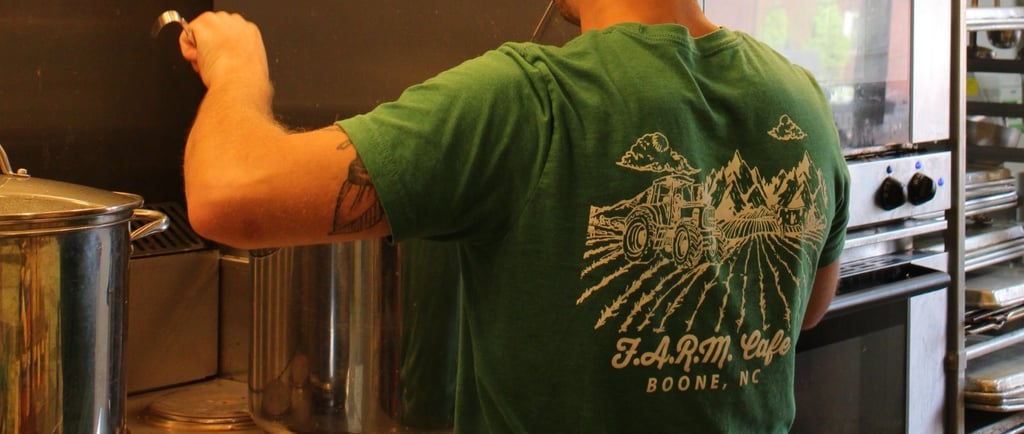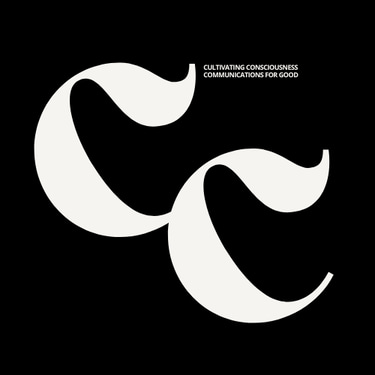Five Things I've Learned at F.A.R.M. Cafe
Reflecting on my one-year mark of working at a community cafe. Whether this post inspires you to work in non-profit, visit a community cafe, or learn more about food sustainability, I hope you take something with you.
COMMENTARY
Kaden Theisen
9/17/20257 min read


Welcome back to Cultivating Consciousness
As I approach my one-year mark at F.A.R.M. Cafe and reflect on my experience working at North Carolina’s first Pay-What-You-Can Cafe, I’ll be sharing five things I have learned in time so far.
These topics are not all-encompassing of my experience at this community cafe, as there are no amount of words I can share to truly communicate my time and experiences so far as I dive into non-profit work, sustainability, community, digital marketing, communications, kitchen work and cooking, volunteer coordination, and more. My goal is to share just a handful of concepts that encapsulate major realizations and aspects. These concepts assist in reminding me of my own impact and self-growth, while hopefully inspiring and teaching others.
#1. Community is Key
Whether you work in a non-profit, the corporate world, are a student, or none of the above, community is an integral part of the human experience. Development and growth in any sector, I believe, is inhibited by a lack of community and communication. F.A.R.M. Cafe is a unique model of cafe inviting individuals of all backgrounds and income levels to obtain a fresh, hot, healthy, and locally-sourced meal. While this is the basis for the Cafe’s mission, once you step inside, you’ll realize that the community runs much deeper than one may initially realize.
One thing brings the entirety of the human species together - social interaction. This is so incredibly apparent at the Cafe. When stepping inside, you’ll be greeted by volunteers serving in all aspects of the cafe: regular diners and out-of-towners, college kids and Boone locals, business owners and meditation-guiders, and so much more. You don’t know who you’ll meet, and what you can exchange or gain from the experience. The staff are integrated among our daily volunteers, so you may not know if the next individual you speak to is a long-time staff member or a volunteer on their first week of the job.
F.A.R.M. Cafe hosts retro community seating in addition to individual tables, where patrons are invited to dine with each other. Diners, volunteers, and staff members communicate to each other on a daily basis, as well as to farmers, producers, our next door neighbors, delivery drivers, community health members and more.
There is an unspoken ideology similar among all individuals taking place in our Cafe, and I believe that to be similar to the Golden Rule: do unto others as you would have them do unto you. The Cafe operates as a unified being, where patrons offer to tidy and clean their space and others in exchange for an affordable, delicious meal and a positive experience. Dining at a for-profit cafe may just feel like an exchange of goods, while dining at a community cafe feels like an immersive experience. Next time you’re in the Cafe, don’t be afraid to say hello!
#2. Sustainability Involves All Aspects
When someone mentions the term “sustainability”, it may be easy for your mind to default to solar panels, plastic straws and electric vehicles. While these things do play a large role, the entire definition of sustainability is “meeting the needs of the present without compromising the ability of future generations to meet their own needs” (United Nations), which encapsulates so much more than what one might think to be considered “sustainability”.
At F.A.R.M. Cafe and in food systems, that looks like our Full Circle Program, a food recovery program where we collect blemished, over-ordered, or near-expiration produce at risk of going to waste from local grocers, farmers, and small businesses. Each week, volunteers prepare ready-to-eat meals, meal kits, and other value-added products using these recovered foods. Products are distributed in two ways: primarily to nonprofit and faith-based organizations serving food insecure individuals. A selection of meals are set aside and available on a donate-what-you-can basis at the Cafe and the High Country Food Hub. This prevents food from entering the landfill while ensuring a higher level of food security for these individuals.
As of August 31st 2025, F.A.R.M. Cafe has received over 4,000lbs of food in 2025. This has turned into over 14,527 meals served in 2025. Our Zero Waste program prevents even more food waste in our landfills, as we compost almost 100% of our food scraps daily. This then contributes to the cycle of growing produce for our local community and cafe, keeping our produce localized and with little environmental impact while providing food for those who are hungry. Talk about killing two birds with one stone!
F.A.R.M. Cafe sources from local farmers which reduces transportation emissions and promotes small scale and organic farming practices. Incorporating these practices reduces pollution and increases soil fertility, contributing to the longevity of our soil and farming endeavors. We offer vegetarian and vegan meals in addition to meat options, reducing the amount of methane greenhouse gases from livestock.
In the Cafe, we offer reusable “Green Boxes”, or to-go containers as an alternative to compostable or landfill takeout containers where patrons make a one-time purchase and then return and use our green boxes indefinitely. We also use L.E.D. lighting which uses 90% less energy than traditional bulbs. Sustainability initiatives are naturally integrated into the cafe’s daily operations and work to meet our current needs while keeping the needs of future generations in mind.
#3. Learn It All
Whether you’re a staff member or just dining in, a non-profit especially one with a model like F.A.R.M. Cafe’s can be a unique opportunity to learn. Aspects I have focused on are expanding my knowledge of sustainable food systems, digital marketing, communications, cooking and kitchen work, organization, volunteer management, and so much more. I am so grateful for the opportunities that this line of work has allowed me to have, and I believe it is only right to take advantage of the things that I can learn so that I can grow. Volunteering at the cafe can help you learn skills such as kitchen skills and cooking, cleaning and organizing, serving, non-profit operations, and more. Even just dining at our Cafe can result in learning of new skills and experiences through observing the Cafe’s operations or engaging in conversation with other cafe patrons. Take the time to learn other perspectives, experiences, and knowledge. The human brain cannot physically be filled, so learn it all!
#4. Be Creative in Fundraising
Fundraising is essential for a non-profit. While we receive daily donations from diners, patrons, and businesses, our model succeeds and grows with a positive ROI. Ways that we make it possible to feed those who may not be able to afford a meal are through our Token program, where individuals can pay-it-forward by purchasing a token at the suggested cost of a meal, which a diner can then use in exchange for a meal. F.A.R.M. Cafe also utilizes a “Buy Boone Lunch” program, where businesses and individuals can pay a certain amount to cover the total costs of operations for the Cafe for one day. These events make a noticeable impact in the way we are able to provide meals for individuals. If someone chooses to pay for their meal on a Buy Boone Lunch day, then their payment contributes to an individual who cannot afford their meal.
F.A.R.M. Cafe also works to partner with local businesses, the local Appalachian State University campus, artists, promoters, farmers, and more. In our experience appealing to multiple audiences through various fundraising methods is beneficial in welcoming and retaining donors. We host a major fundraiser once a year, titled Small Bites for a Big Cause, in which 10 local chefs are invited to prepare individual bites of food based on a theme, and participants can try each bite and vote on their favorites. We integrate games, raffles, music, and auctions to tie the whole event together, and raise as much as we can for the operations of the Cafe.
Other fundraisers we’ve hosted include our annual Disc Golf Tournament, a De-Stress/Game Night for students, Drag Shows, Cooking Classes, and more. Consider your audiences, who would be interested, who you can partner with, and how to execute!
#5. Personal Growth
You may have noticed a theme throughout my reflections along the lines of development and personal growth. F.A.R.M. Cafe is community-oriented without a doubt, but there is much personal growth that occurs when you involve yourself in an environment such as the Cafe’s. I entered the Cafe at full-force in the immediate days following Hurricane Helene, possibly the worst disaster in WNC’s history. The need to enter this Cafe with initiative, drive, and compassion was increased tenfold as a result of this hurricane. With little experience at the Cafe and with hurricane relief, I did my best to offer the best service that I could while assisting in the operations of the cafe and helping to feed as many people as possible. This experience, while incredibly tragic and devastating, showed me that I am capable of learning and adapting. Here we return to the Golden Rule, as the main concept I noticed in this time was that the more that we gave to our community, the more that was returned to us in the form of volunteers, food and monetary donations, and stories. Each staff member, volunteer, donor, and diner had a unique and personal experience following this disaster, and each experience was amplified by the assistance and voices of other community members. I’ve learned that as a whole, and individually, humans are resilient and compassionate, and so am I.
I take these concepts with me every day a year from the event, using every day to learn about non-profit work, food security, community and the individuals around me, sustainability, adaptation, and more. Each day I look forward to the conversations that I am going to have, the food that I am going to help prepare, the look on people’s faces when I explain our mission, the creative projects I get to spearhead, and the skills I am going to learn that I will adapt and utilize for the rest of my life. Working at F.A.R.M. Cafe has taught me so much, and I look forward to what it teaches me in the future.


